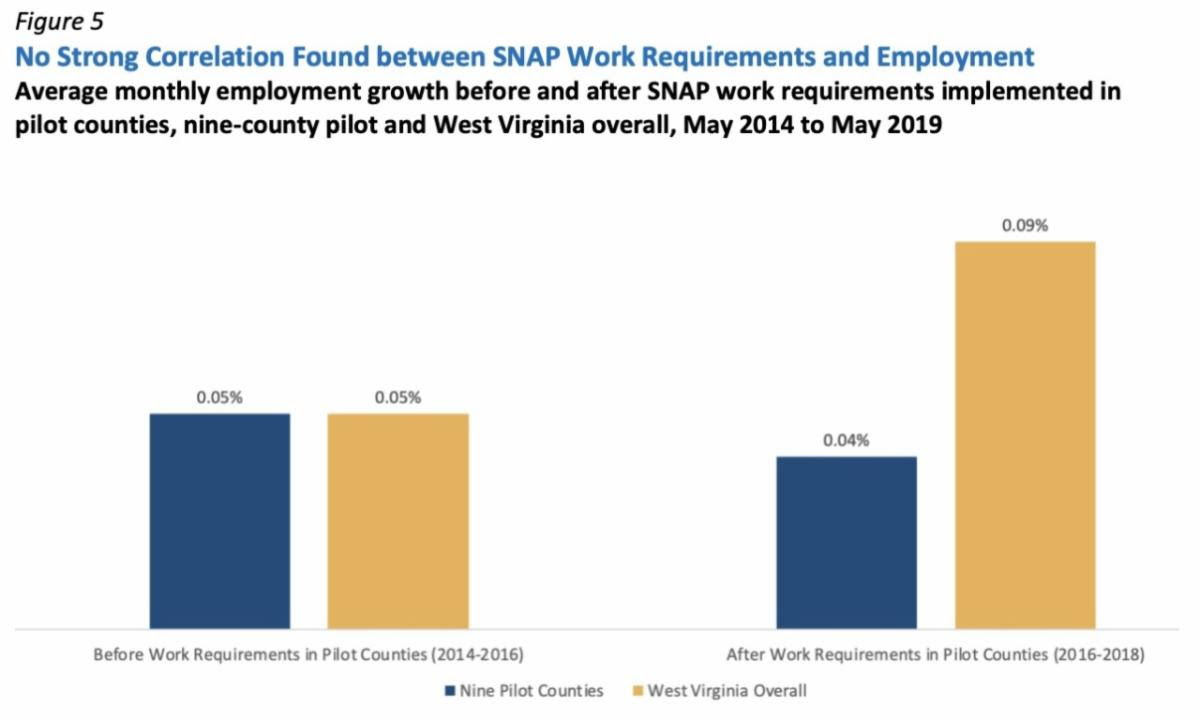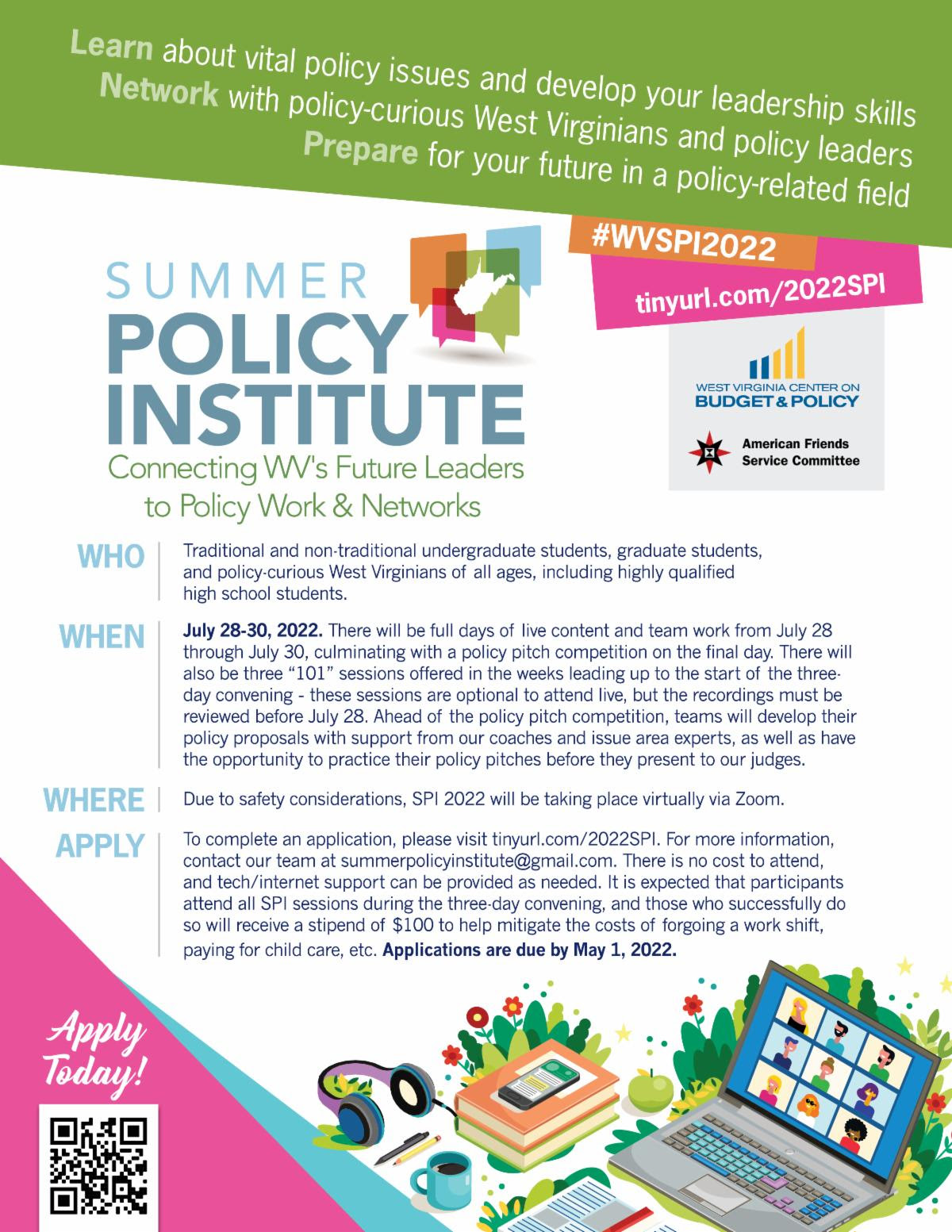Essential workers were championed throughout the pandemic for their critical jobs keeping our economy afloat. But now, West Virginia legislators are considering gutting earned unemployment benefits for those very same workers if they lose their jobs through no fault of their own. Senate Bill 2 would cut the number of weeks that displaced workers are eligible for unemployment insurance from 26 weeks to as few as 14 weeks. But contrary to arguments in favor of SB 2, data indicates that slashing eligible weeks of unemployment benefits will not improve labor force participation.
The legislation is up for passage tomorrow – please join us in contacting your legislators today and urging them to reject needless and harmful cuts to earned unemployment benefits.
SB 2 will endanger economic security and peace of mind for workers, children, and families, while also harming our state’s economy and doing nothing to address lawmaker’s stated goal of filling job openings in West Virginia. What’s more, recent research found that the harmful effects of job loss on opioid overdose mortality decline with increasing state unemployment benefit levels. As such, especially in West Virginia – a state that has been ravaged by the overdose epidemic – it is not hyperbolic to suggest that cutting the weeks of unemployment insurance available to workers will have an adverse impact on opioid overdose deaths.
Again, please join us in contacting your legislators and urging them to vote no on SB 2.
Learn more about how SB 2 needlessly harms West Virginia workers and families in our blog posts here, here, and here.
Senate Bill 71, an industry-backed bill that takes away the power of local elected officials to pass policies broadly supported by their voters, will likely be up for passage in the House tomorrow. If the legislation passes, cities would be subject to the whims (or more likely inaction) of the state on minimum wage, paid leave, apprenticeship programs, conversion therapy bans, and just about anything else.
While SB 71 is currently on the inactive calendar, nothing is truly defeated until the legislative session ends Saturday at midnight. Between now and then, there will be tremendous pressure from proponents of the bill to revive it – we need your help to to make sure legislators are hearing from us, too.
Please join us in calling or emailing your Delegates. You can find email addresses and phone numbers for all House members here. You are welcome to borrow from our sample message below:
Delegate _________, I am urging you to vote no on SB 71, industry-backed legislation that would take away the power of local elected officials to enact policies supported by their constituents. Every community is different and deserves the ability to develop their own policies that reflect the unique needs and values of the people living there. Mayors and city councils know what their municipalities need. Let them do their jobs and serve their constituents by rejecting this needless and harmful legislation.

Our February issue brief highlighted that expanding a failed SNAP time limit pilot program statewide would likely heighten hunger and food insecurity without meeting the program’s goal of increasing employment among impacted SNAP recipients. The piece urged lawmakers to act this legislative session to reverse course and protect West Virginians’ access to this critical food assistance. They failed to do so. A recent article provides further details. Excerpt below:
Over the last year, West Virginia lawmakers have turned their attention to the state’s hunger problem, a move praised by anti-hunger advocates. A new anti-hunger workgroup pushed for a multimillion-dollar CARES Act investment to food banks and pantries, and the group backed a bill moving through the Legislature that would help feed students outside of school hours.
But these positive changes are coupled with lawmakers’ failure to act on addressing the upcoming end to SNAP benefits for thousands of West Virginians, a move that will likely push more adults onto the state’s already struggling food charities, like church pantries and hot meal programs.
The impending welfare changes are due to a 2018 law that overhauled the state’s use of SNAP.
The measure, billed as a way to combat benefits fraud, requires SNAP recipients who are “able-bodied adults without dependents” to prove they are working or training for at least 20 hours a week or benefits are cut off after three months. It was introduced by Delegate Tom Fast, R-Fayette, who didn’t respond to a request for an interview.
The law change was meant to push people into the workforce, a continuation of an earlier state pilot program that was rolled out in several counties, despite evidence that the approach didn’t work.
“Our best data,” the state Department of Health and Human Resources reported at the time, “does not indicate that [limiting SNAP benefits] has had a significant impact on employment figures.”
Instead, people were kicked out of the program. In January 2020, the struggles of some West Virginians to get enough work to hold on to the benefits was highlighted nationally. By the next month, DHHR reported 8,093 SNAP recipients lost their benefits across 17 counties due to not meeting the work requirement.
But some adults have been able to stay on the program since 2018, because the law also allowed the state to waive that three-month benefit cap for people in counties with high unemployment — which is the situation in more than half of West Virginia counties. The federal government also put a temporary ban on cutting off benefits nationwide during the pandemic.
As the pandemic wanes, the federal ban will likely be lifted. And West Virginia’s ability to waive the benefit cap in any county expires under the current law on Oct. 1.
This session, a bill sponsored by Sen. Charles Clements, R-Wetzel, would have gotten rid of the October deadline. But it died; lawmakers didn’t even bring it before one committee for discussion.
You can read the full article here and our full issue brief here.

The Summer Policy Institute (SPI) is an annual convening hosted by the WVCBP and the American Friends Service Committee that brings together highly qualified traditional and non-traditional undergraduate students, graduate students, and policy-curious people of all ages to build policy knowledge, leadership skills, and networks.
Attendees participate in interactive sessions where they learn the basics of data, policy, and state government and build their organizing and advocacy skills. Throughout the institute, participants work in small groups to identify and develop policy proposals to shape the future they want to see in West Virginia, culminating in team “policy pitches” to state legislators and policy professionals. Many SPI attendees have gone on to continue advocating for their policy idea and to hold internships with West Virginia non-profits and in state government.
This year’s SPI theme is “Growing a West Virginia that Works for Everyone.”
Due to ongoing public health considerations, SPI 2022 will take place virtually via Zoom from July 28-30. Find further details and instructions to apply in the flyer below and on our event landing page here. There is no cost to attend. Please don’t hesitate to reach out to our team at summerpolicyinstitute@gmail.com with any questions.
We will be accepting applications through May 1. People of all ages are welcome to apply, so please feel free to share with any folks you think may be interested!

Since July 2021, most households with children had received monthly enhanced Child Tax Credit payments of $250- 300 per child. However, the enhanced Child Tax Credit was temporary and expired at the end of 2021 unless Congress acts to extend it in 2022 through the Build Back Better Act or other legislation.
The impact on children and families since the expiration of the enhanced Child Tax Credit has been severe. Between Dec. 2021 and Jan. 2022, there was a staggering 41 percent increase in child poverty nationwide due to the loss of the monthly payments.
If you received monthly Child Tax Credit payments, we’d love to hear how they had been helping your family and how your family has been impacted now that the payments have (at least temporarily) stopped being distributed.
Join us in our advocacy by completing our survey here or participating in the #Unbearable Child Tax Credit campaign.
Learn more about what’s at stake if the enhanced Child Tax Credit is not extended in our blog post here.
Find guidance on how to collect your Child Tax Credit payment here.

The WVCBP’s Elevating the Medicaid Enrollment Experience (EMEE) Voices Project seeks to collect stories from West Virginians who have struggled to access Medicaid across the state. Being conducted in partnership with West Virginians for Affordable Health Care, EMEE Voices will gather insight to inform which Medicaid barriers are most pertinent to West Virginians, specifically people of color.
Do you have a Medicaid experience to share? We’d appreciate your insight. Just fill out the contact form on this webpage and we’ll reach out to you soon. We look forward to learning from you!
You can watch WVCBP’s health policy analyst Rhonda Rogombé and West Virginians for Affordable Health Care’s Mariah Plante further break down the project and its goals in this FB Live.
